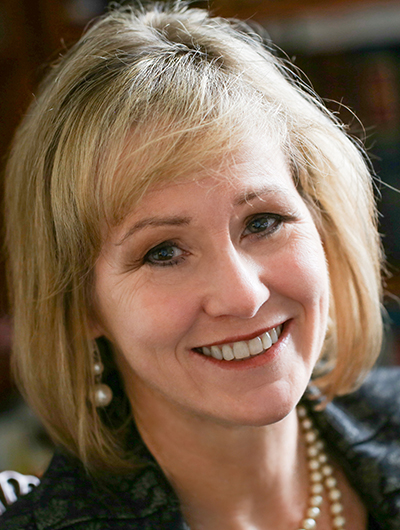Spotlight on Sections: Section on Leadership
By Barbra Elenbaas
The purpose of this Section is to promote scholarship, teaching, and related activities that will help prepare lawyers and law students to serve in leadership roles. The Section also will make recommendations to the Association on matters of interest with respect to the research and teaching concerning leadership development in the legal profession.
Chair: Deborah Rhode, Stanford Law School
Chair-Elect: Leah Witcher Teague, Baylor University School of Law
 Deborah Rhode, Stanford Law School. Photo courtesy of Stanford Law School.
Deborah Rhode, Stanford Law School. Photo courtesy of Stanford Law School.
 Leah Witcher Teague, Baylor University School of Law. Photo courtesy of Baylor University School of Law.
Leah Witcher Teague, Baylor University School of Law. Photo courtesy of Baylor University School of Law.
What is the Section on Leadership about?
Deborah Rhode: The most crucial challenges of our time involve issues of leadership. In the U.S., no occupation is more responsible for producing leaders than law. We supply a majority of American presidents and almost half the members of Congress, and even when lawyers are not occupying top positions in their workplaces, they head teams, committees, task forces, and charitable initiatives. The lawyers who lead in legal policy and business settings make decisions that affect thousands of individuals. Although lawyers represent less than one percent of the population, they are well represented in all levels and types of leadership. A lawyer’s leadership capacities matter, particularly when society faces problems of growing scale and complexity.
Our need for leaders who have vision, values, and technical competence has never been greater. But our ability to meet this need is in real question. A survey by the Harvard Center for Public Leadership found that over two-thirds of Americans think the nation has a leadership crisis. The latest Gallup poll reported that only a fifth of the public rates the honesty and ethical standards of lawyers as high. And a Harris poll found that only 11 percent of the public has a great deal of confidence in people running law firms. In this context, leadership development takes on a new urgency.
Although a common assumption is that lawyers are “born not made,” research suggests the opposite. Leadership capabilities can be learned, and law schools need to play a role in making that happen.
Leah Witcher Teague: That’s what brings us to this section. Law schools have not been intentional about any effort to develop the skills sets, character, vision, or value system that are necessary to be effective leaders. Business schools, for example, have been doing this for decades.
While we are still producing the highest number of leaders, we have comparatively fewer lawyers in leadership positions than in the past. In the 1880s, 80 percent of the members of Congress were lawyers—far greater than any other profession. That number is down to about 40 percent now, at a time when our country needs leadership that is effective. Lawyers offer many skill sets that are helpful in accomplishing goals and effectuating change. Law schools develop students’ proficiencies in identifying and analyzing issues and problems, and communicating clearly and persuasively as necessary. Lawyers know that negotiation and compromise may be necessary to move past gridlock. Our code of professional conduct establishes an expectation of civility and integrity in our actions.
Why is organizing around leadership particularly important right now?
LWT: The legal profession is at a crossroads. It’s a matter of establishing the future role of lawyers in society. The profession is forever changed—we have an inkling of what’s to come with technology and the impact of artificial intelligence on our profession, but we don’t really know the full implications. We do know that many tasks performed by lawyers in the past will be automated. We have to adapt to that sooner rather than later. We also have to be concerned about the lack of trust in lawyers and lack of faith in the institution that is our system of democracy and its rule of law.
Planning for what society needs from lawyers in the future is why we should begin to think about skills beyond learning substantive law or technical skills, which have been the focus of law schools traditionally. The skill sets needed as a counselor or leader—those who are going to help clients and organizations work through their issues—are going to be even more important to lawyers in the future. They will be just as important as professional responsibility, ethics, and service to the public. Leadership should be equally pervasive in our language as we teach our students about our obligations and opportunities as lawyers.
DR: Leadership development is a $43 billion-dollar industry with almost no solid empirical research on what difference any of it makes. That’s fairly shocking. Whether or not people found a particular leadership workshop valuable or not immediately after the fact is not all that relevant. What’s important is whether they did anything differently six months or five years later. Institutions are starting to do that kind of monitoring, but the data isn’t really there—as a field generally, and certainly not for law school teaching.
It’s ironic that even though law produces the most leaders, law schools have been especially slow to embrace the need for formal training. Although leadership responsibilities are a dominant theme in commencement speeches and mission statements, the topic is missing in our day-to-day teaching. Law schools are producing leaders; they’re just not being intentional about preparing them for that role. That’s what needs to change, and that’s why we’re so grateful to have the section, which will try to encourage more professors to integrate some of what we know about leadership education into their core courses, even if they’re not teaching classes centering on leadership.
We particularly need to know what difference leadership courses and programming is making in graduates’ experience in law school and later in life. A number of schools are pioneering ways to monitor the effectiveness of teaching and programmatic initiatives. Collectively, I think the section can be a vehicle for bringing those people involved in those evaluation efforts together.
How did the idea for this section arise?
LWT: When I created a leadership development program at Baylor Law in 2014, I searched for course and program descriptions and found almost none in our American law schools. My list of law professors who were teaching, speaking about, or writing about leadership was very small, but there was Deborah. She had a book on leadership that we used as a resource in our Leadership Engagement and Development (LEAD) course created as part of our leadership development program.
I actually met Deborah through her work in the area of women’s leadership development. Deborah and I served on a panel discussing women’s leadership development at the annual International Leadership Association meeting in 2015, and I told her about the program I had created at Baylor Law. She told me about her Lawyers as Leaders book that was about to be published. She also identified other law professors to add to the list. After some further conversations, we agreed to co-host a breakfast at the 2016 AALS Annual Meeting.
The 2016 AALS Annual Meeting had several programs with a leadership component, thanks to then-President Kellye Testy’s interest in leadership development for lawyers. It was very heartening to me, not having been to AALS meetings for a long time, to come back and to hear leadership language being used. At our breakfast, about 20 of us met and generated several ideas about modes of collaboration, including the creation of a new section.
DR: Together, we figured out a process for making the section happen. A lot of people with a lot of good ideas volunteered to be on the executive committee—I am grateful to the people who stepped up to serve on both the nominating committee and the opening slate of officers. This is uncompensated and unrewarded labor in the academic world, which would rather see you publish than do a lot of committee work.
What made you interested in the scholarship and teaching of leadership to begin with?
DR: It became clear to me that there were many professors incorporating leadership development into their classes but they were doing it without using the label of “leadership,” sometimes very intentionally. Schools still do not recognize the value and the need for nontraditional, non-substantive, non-Socratic-based knowledge building. Faculty would leave “leadership” out of a title or description for fear that that might not make it through a curriculum process.
Women, especially, have a complicated relationship with power because it’s punished in women. I initially worried that classes wouldn’t get a lot of women because they don’t want to be thought of as wanting power. We talked in the section about different strategies for dealing with student concerns—such as calling a leadership development course something else. Earlier in my career, I had the same discussion around ethics, which a lot of faculty thought of as kind of touchy-feely and moralistic and unnecessary to integrate in the core curriculum. I think the consensus today around leadership is that it matters less what you call it and more that you include the content.
LWT: It is more about being intentional in preparing students to successfully navigate scenarios and opportunities, so strategies might differ depending on what is most effective. We want to develop future lawyers who will be better equipped to serve and to lead.
What is particularly useful about leadership skills and training that you’d like law schools to take note of?
DR: The same skill sets that are crucial for leaders—emotional intelligence, or decision making, for example—are crucial for lawyers in all aspects of their practice. Leadership literature teaches those skills which turn out to matter much more in certain situations than cognitive ability. In law schools we reward analytic ability. But the literature shows that the best leaders are not necessarily the smartest people in the room. The best leaders are people who have a range of cognitive and interpersonal skills. Everything that we do in a leadership class is going to be immediately useful for lawyers, whatever role they end up playing.
LWT: I used to emphasize the importance of leadership from the perspective that we know lawyers are going to serve as leaders in their communities and in organizations; therefore, law schools should incorporate these skills into their core curriculum. I got pushback from that, which required me to rethink why I thought it was so vitally important for today’s law students. I then realized the topics covered in leadership development programming also help each one of us to be a more effective lawyer and more valuable employee. The skill sets are advantageous for both scenarios.
DR: One final example: I’m currently organizing a program on stress management and substance abuse, which is another life skill we don’t spend time in law schools dealing with. It’s a crucial issue for lawyers in general, as well as a leadership issue, because the time commitments and stress of being responsible for an organization often takes an enormous toll. People have to learn how to manage that. Lawyers have one of the highest rates of substance abuse and depression of any profession. Law schools need to play a leading role in helping their graduates learn how to deal with what they will encounter in practice.
LWT: As we think about how to most effectively teach and train our current students, we’re focusing on many different aspects: stress management, grit, resilience, and ability to accept feedback constructively in a healthy manner. All of these are essential parts of leadership development and are not matters that have been part of the law school curriculum or programming in the past. We mentioned earlier the adage about lawyers being born, not made. What I love about leadership development programs is the recognition that the characteristics you’re born with don’t define you. There is room to grow.
Students in a leadership development program are collectively going through a journey of self-discovery, assessment, and growth in an environment that allows the freedom to think about who they want to be and to have some guidelines in place that will help them stay true to that path.
Is there a long-term vision for what you would like the section to become?
LWT: We hope the concept of developing lawyers to be leaders will eventually be part of the fabric of law schools and that our students graduate with a vision of themselves as leaders in their communities. Every law graduate will be better equipped for the challenges they will face because they worked on developing skills, vision, and a moral compass that will facilitate their success and enhance their ability to make a difference in the world.
DR: Martha Barnett, the second-ever woman President of the ABA, and I were both known for saying that one goal of the events we were doing for the advancement of women was to make a world in which these sorts of events were no longer necessary. We would already have leveled the playing field for women. Similarly, I would like to see a world in which some of what we are doing in the Leadership section is no longer necessary because we have addressed those problems elsewhere—other sections are focusing on the issue, and leadership is fully integrated in the law school curriculum.
But there will always be a need for leaders. And lawyers, given this country’s history and tradition, will always play a central role in that. As long as there is an AALS, I suspect there will be a need for a Leadership section. I hope that as long as the United States has a rule of law and a role for lawyers in national governance, there will be a role for law schools in leadership development.
 2018 Annual Meeting Arc of Career Program, “Leadership Development in Law School.”
2018 Annual Meeting Arc of Career Program, “Leadership Development in Law School.”
 Deborah Rhode, Stanford Law School. Photo courtesy of Stanford Law School.
Deborah Rhode, Stanford Law School. Photo courtesy of Stanford Law School. Leah Witcher Teague, Baylor University School of Law. Photo courtesy of Baylor University School of Law.
Leah Witcher Teague, Baylor University School of Law. Photo courtesy of Baylor University School of Law. 2018 Annual Meeting Arc of Career Program, “Leadership Development in Law School.”
2018 Annual Meeting Arc of Career Program, “Leadership Development in Law School.”